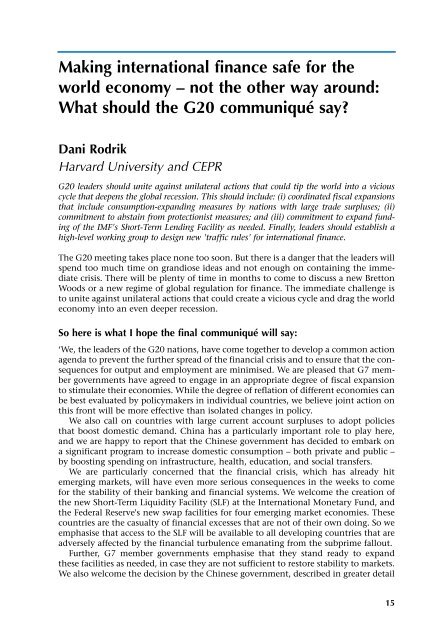What G20 Leaders Must Do To Stabilise our Economy and Fix ... - Vox
What G20 Leaders Must Do To Stabilise our Economy and Fix ... - Vox
What G20 Leaders Must Do To Stabilise our Economy and Fix ... - Vox
Create successful ePaper yourself
Turn your PDF publications into a flip-book with our unique Google optimized e-Paper software.
Making international finance safe for theworld economy – not the other way around:<strong>What</strong> should the <strong>G20</strong> communiqué say?Dani RodrikHarvard University <strong>and</strong> CEPR<strong>G20</strong> leaders should unite against unilateral actions that could tip the world into a viciouscycle that deepens the global recession. This should include: (i) coordinated fiscal expansionsthat include consumption-exp<strong>and</strong>ing measures by nations with large trade surpluses; (ii)commitment to abstain from protectionist measures; <strong>and</strong> (iii) commitment to exp<strong>and</strong> fundingof the IMF's Short-Term Lending Facility as needed. Finally, leaders should establish ahigh-level working group to design new 'traffic rules' for international finance.The <strong>G20</strong> meeting takes place none too soon. But there is a danger that the leaders willspend too much time on gr<strong>and</strong>iose ideas <strong>and</strong> not enough on containing the immediatecrisis. There will be plenty of time in months to come to discuss a new BrettonWoods or a new regime of global regulation for finance. The immediate challenge isto unite against unilateral actions that could create a vicious cycle <strong>and</strong> drag the worldeconomy into an even deeper recession.So here is what I hope the final communiqué will say:‘We, the leaders of the <strong>G20</strong> nations, have come together to develop a common actionagenda to prevent the further spread of the financial crisis <strong>and</strong> to ensure that the consequencesfor output <strong>and</strong> employment are minimised. We are pleased that G7 membergovernments have agreed to engage in an appropriate degree of fiscal expansionto stimulate their economies. While the degree of reflation of different economies canbe best evaluated by policymakers in individual countries, we believe joint action onthis front will be more effective than isolated changes in policy.We also call on countries with large current account surpluses to adopt policiesthat boost domestic dem<strong>and</strong>. China has a particularly important role to play here,<strong>and</strong> we are happy to report that the Chinese government has decided to embark ona significant program to increase domestic consumption – both private <strong>and</strong> public –by boosting spending on infrastructure, health, education, <strong>and</strong> social transfers.We are particularly concerned that the financial crisis, which has already hitemerging markets, will have even more serious consequences in the weeks to comefor the stability of their banking <strong>and</strong> financial systems. We welcome the creation ofthe new Short-Term Liquidity Facility (SLF) at the International Monetary Fund, <strong>and</strong>the Federal Reserve's new swap facilities for f<strong>our</strong> emerging market economies. Thesecountries are the casualty of financial excesses that are not of their own doing. So weemphasise that access to the SLF will be available to all developing countries that areadversely affected by the financial turbulence emanating from the subprime fallout.Further, G7 member governments emphasise that they st<strong>and</strong> ready to exp<strong>and</strong>these facilities as needed, in case they are not sufficient to restore stability to markets.We also welcome the decision by the Chinese government, described in greater detail15














